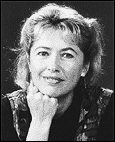New Faculty Profile: Jocelyn Guilbault, Ethnomusicologist
By Julia Sommer, Public Affairs
Posted February 10, 1999
 Jocelyne Guilbault |
Already she is teaching "Music in American Culture," a large undergraduate course that satisfies the American cultures requirement, and a graduate introduction to ethnomusicology seminar.
A self-described Quebecoise, Guilbault earned her BA and MA degrees at the Universit» de Montreal, only learning English when she started PhD studies at the University of Michigan.
By then she had already discovered her life's work -- the study of traditional and popular music of the eastern Caribbean.
"Like most good things in life, it happened by chance," she says with Gallic exuberance. She was already a fan of African music when a professor asked her to join a study of French Creole music in the Caribbean. She chose St. Lucia in the West Indies for her research, arriving in 1979, the year the tiny island won independence from Britain.
Guilbault settled in a small fishing village there, learned to speak French Creole fluently, and made the first in-depth study of the traditional music of the island, including music for funeral wakes, full moon parties, quadrille dances and musical societies. Her dissertation, published in 1984, is titled "Musical Events in the Lives of the People of a Caribbean Island: St. Lucia."
Guilbault spent part of every year in St. Lucia until 1987. She is a member for life of the Folk Research Center there, which holds copies of all her tapes and writing, some of it in Creole.
Then she embarked on a new study, this time of a popular contemporary music form -- Zouk -- in the French Creole islands of Martinique, Guadeloupe, Dominica and St. Lucia. With roots in the islands of Haiti, Guadeloupe, Dominica and in French Africa, Guilbault says Zouk is now popular the world over, especially in French-speaking nations.
"I was no longer in fishing villages," she says. "Now I was in the capitals learning about the music industry -- recording studios, promoters, marketing, distribution."
Her resulting book, "Zouk: World Music in the West Indies," was published by University of Chicago Press in 1993.
Now Guilbault is finishing up "The Music Industry of Calypso," which focuses on Trinidad, Barbados, Antigua and Grenada. She has gone to Trinidad's famous Carnival every year since 1994. "It kills me that I can't go this year," she laments. "Carnival determines what music will be played for the rest of the year."
She is also researching a book on calypso superstars of the English Caribbean.
"I only study music that I love," says Guilbault. "Otherwise I would not be able to pay homage to it, to feel for it."
In her American music course she will concentrate on the Caribbean diaspora, while her GSIs cover other ethnic groups. "There's calypso wherever you are," she says, noting that Carnival ("Caribana") in Toronto brings $200 million to that city every year.
Guilbault served on the faculty of the University of Ottawa since 1984. While a visiting professor here in 1993, it occurred to her that Berkeley might be the one place for which she'd leave Canada.
"I came here because of the tremendous resources," she says -- "the scholars, the library, the cultural life, and, I have to say, the weather. Berkeley and the Bay Area are special on so many levels."
From a musical family, Guilbault started playing the piano at age 4. "We didn't listen to recorded music, we made our own," she recalls. She decided against a career as a performer, "because for that, you have to be truly exceptional," she says.
When Guilbault discovered ethnomusicology, "it immediately clicked because it combines my three loves -- music, travel and languages," she says. "And because ethnomusicology is interdisciplinary, it gives me the opportunity to learn about so many different subjects -- politics, economics, communications, anthropology, to name just a few. I'm happy and lucky to have found a path that has been so stimulating at both the human and intellectual levels. It has been absolute magic for me."
Says music chair Wendy Allanbrook: "the Department of Music is thrilled to welcome Jocelyne Guilbault to its faculty as the long-awaited third member of our ethnomusicology division. She is already bringing new excitement to our large lecture class, Music in American Culture."
![]()
![]()
February 10 - 16, 1999 (Volume 27, Number 22)
Copyright 1999, The Regents of the University of California.
Produced and maintained by the Office of Public Affairs at UC Berkeley.
Comments? E-mail berkeleyan@pa.urel.berkeley.edu.